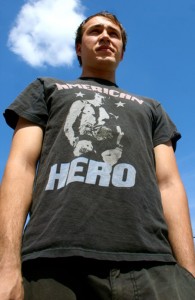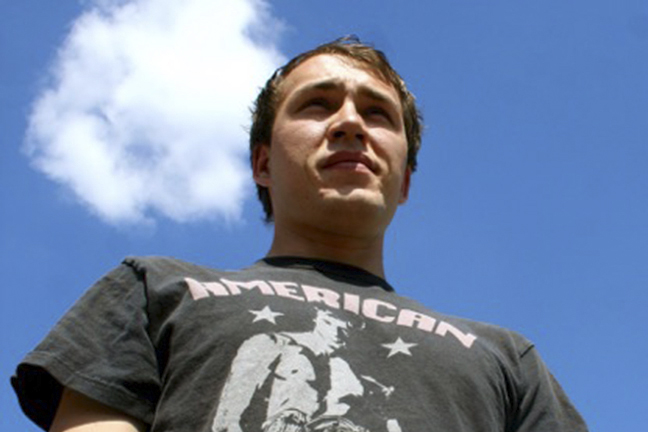By Adam Dodson/reporter
It’s hard to imagine a scenario more quintessentially American than Russian-born Dmitry Ivy staring out the window of a Fort Worth Dairy Queen, watching traffic cruise by on Montgomery Street as he polishes off a cheeseburger and a large Dr Pepper.
The 24-year-old TCC student from eastern Russia spoke next to no English when he arrived 12 years ago.
“When I first got here, the only word I knew was ‘Merry Christmas,’” he said.

Photo by Adam Dodson/The Collegian
Though he hasn’t lived there for a long time, he visited Russia as recently as the winter of 2013. He remembers standing in the center of Moscow’s Red Square and looking at the big clock with the running countdown for the Winter Olympics about to be held in Sochi.
Unfortunately, as fond as that memory is for Ivy, it will forever be linked with an equally unpleasant one. Shortly after he returned to Texas, hostilities between Russia and Ukraine began.
“Not three months later, the war started, and I remember thinking, ‘How am I going to get back there?’ now that our relations (U.S./Russian) have changed so much,” he said.
He is hesitant to trust the mainstream media in Russia, Ukraine and in the West for their role in fanning the flames of war with simplistic propaganda. For instance, he said many reports from state-funded RT, or Russia Today, should be taken with a large hunk of salt.
“We do not read RT. It is propaganda,” he said. “The correspondents, I mean they’re pro-Russian. They get paid to put out a certain view, so of course they’re gonna be pro-Russian. I mean, I try watching some of their interviews, and, I mean, it’s just terrible. It’s like watching CNN and the FOX … I don’t really watch TV anymore. I just read the news on my iPad.”
Ivy is not alone in wishing people had a more educated view. NW history professor Laura Wood, who holds a doctorate in modern European history and a master’s degree in international politics with a focus on Eastern Europe and the old Soviet Union, has been discussing the Ukrainian conflict with her students. She wants them to look at current events as they develop on the world stage through the lens of historical complexity.
In between the two world wars, when the Bolshevik Revolution was taking place, the Ukrainians had their own revolution from Russia and declared themselves an independent Ukrainian Socialist Republic, separate from the Soviet Union. A deal was struck between the Soviet Union and post-war Germany to keep Ukraine independent in the hopes that Germany could purchase grain from Europe’s breadbasket.
“But when Stalin comes to power, there’s no way he’s going to let that happen,” Wood said. “So he basically uses economic power to force Ukraine to deal with and be with Russia.”
It gets more complex from there.
“In 1921, the Soviets invade, and that war goes on into the 1930s. Then he cuts off food to the Ukrainians. Before World War II starts, 7 to 10 million Ukrainians starve to death,” she said. “So when the Germans invade, some of them initially side with the Germans against the Soviet troops in Ukraine.”
However, said Wood, “they soon realize the Germans are just as bad or even worse than the Russians. But they were already in a struggle with the Soviets when the Germans invaded. So you can see, it’s very complicated.”
Fast-forward through 75 more years of contentious history that included the Cold War, the fall of communism and now Vladimir Putin, the enigmatic leader with incredible staying power.
Given America’s history of entering the civil wars of other nations with less-than-optimal results, Ivy doesn’t think an antagonistic stance by the U.S. against a nuclear Russia is a particularly great idea. He feels this is a regional affair, and it should be treated as such.
“This is a civil war with strings attached. Ya know?” he said. “That’s what I want to call it, ’cause you know, two poker players might cut each other when no one’s looking, but they don’t want to flip over the table and ruin the whole game.”
SE history assistant professor Bradley Borougerdi said the West must understand that Russian history began in Ukraine.
“The Kievan Rus is the first Russian empire to ever emerge,” he said. “The center of that history is where Ukraine is now. So Russians have a very hard time letting go of a part of the world that in their mind belongs to them culturally.”
Borougerdi emphasized that all of the old Soviet satellite states aligning themselves with the West is alarming to many Russians. He also agreed with Ivy on the importance of due diligence in obtaining information from verifiable sources.
“Anytime you see somebody giving you a simplified version, be wary of it,” he said. “Know that these things are extremely complex. There are long, deep historical roots behind the problems in this area of the world.”
Opposition leader Boris Nemtsov, who was reportedly about to release damning information on Putin in regard to Ukraine, was gunned down Feb. 27 just outside the Kremlin. This led to outrage and questions about the Kremlin’s possible role in the murder.
As far as Ivy is concerned, the answers are there for those persistent enough to search for them.
“I would just want to say, question everything,” he said. “Question your media. Question Russian media. Question their media. Question every media there is because nothing is as it seems. Because there is an information war going on.”

























